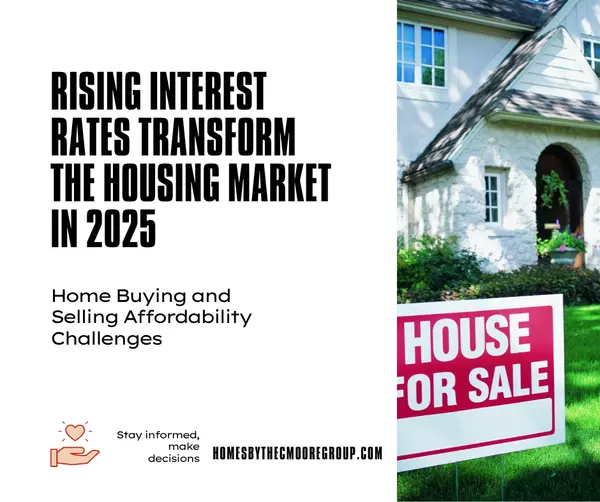How Rising Interest Rates Are Shaping the Housing Market

How Rising Interest Rates Are Shaping the Housing Market
The housing market is a living, breathing ecosystem every shift in the economic weather sends ripples through neighborhoods, cities, and families’ plans. Right now, the biggest storm on the horizon is the rise in interest rates. Whether you’re a hopeful homebuyer, a seller eyeing your next move, or simply a curious observer, understanding how these rates are shaping the market is key to making smart decisions. Let’s dive deep into the causes, the effects, and the real stories behind the headlines.
Why Are Interest Rates Rising?
Interest rates are like the heartbeat of the economy. When inflation surges meaning the cost of everyday goods and services climbs the Federal Reserve steps in to raise rates. Their goal? To slow borrowing and spending, which helps cool off inflation. In the past two years, rates have climbed from historic lows to levels not seen in over a decade. For context, the average 30-year fixed mortgage rate in the U.S. hovered around 3% in 2021; by 2024, it’s often been above 7%.
The Domino Effect: Buyers, Sellers, and the Entire Market
For Buyers: A New Reality
Imagine you’re a first-time buyer. You’ve saved for years, only to discover that rising rates have pushed monthly payments out of reach. For example, on a $400,000 home, a jump from 3% to 7% interest can mean paying nearly $900 more each month. This forces many to rethink their budgets, widen their search areas, or even postpone their dreams of homeownership.
Some buyers are getting creative considering adjustable-rate mortgages (ARMs), looking at smaller homes, or teaming up with family members. Others are turning to renting, which has its own set of challenges as demand for rentals spikes.
For Sellers: Adjusting Expectations
Sellers, meanwhile, are navigating a trickier landscape. During the low-rate boom, homes sold quickly and often above asking price. Now, with fewer buyers able to afford high prices, homes can linger on the market. Sellers are responding by:
- Lowering listing prices
- Offering concessions, like covering closing costs or including appliances
- Investing in upgrades to make their homes stand out
Yet, inventory remains low in many neighborhoods, which can help stabilize prices despite fewer sales. It’s a delicate dance between supply and demand.
For Homeowners: To Move or Not to Move?
Existing homeowners with fixed-rate mortgages—especially those who locked in rates below 4%—are often staying put. Why trade a low payment for a much higher one? This phenomenon, called the “lock-in effect,” is keeping many would-be sellers on the sidelines, further tightening inventory.
Those with adjustable-rate mortgages or who need to refinance, however, may face higher costs. Some are choosing to renovate rather than relocate, fueling a boom in home improvement projects.
The Broader Economic Picture
The housing market doesn’t exist in a vacuum. Rising interest rates also impact:
- Construction: Builders face higher costs to finance new projects, which can slow down the creation of new homes.
- Investors: Real estate investors may see slimmer returns, especially if rental income doesn’t keep pace with higher mortgage payments.
- Local economies: Slower home sales can mean less business for movers, contractors, and local retailers.
It’s a chain reaction that touches nearly every corner of the economy.
Stories from the Front Lines
Consider Sarah and Mike, a young couple in Toronto. They spent months house-hunting, only to watch their pre-approved mortgage amount shrink as rates rose. Faced with tough choices, they opted for a smaller townhouse instead of a detached home. Meanwhile, their friends in Dallas decided to stay put and remodel their kitchen rather than brave the higher rates for a new place.
These stories are playing out across North America, reflecting the new realities and the resilience of buyers and sellers alike.
Looking Forward: What’s Next?
Experts predict that rates may remain elevated until inflation is firmly under control. Some economists foresee a gradual easing by late 2025, but much depends on global events and economic data. In the meantime, expect:
- More balanced markets, with fewer bidding wars
- A continued shortage of homes for sale, supporting prices
- Creative solutions from buyers and sellers alike
Tips for Navigating Today’s Market
- Get pre-approved early: Know exactly what you can afford before you shop.
- Be flexible: Consider different neighborhoods, home types, or even renovation projects.
- Work with a local expert: A knowledgeable real estate agent can help you spot opportunities and avoid pitfalls.
- Think long-term: Markets ebb and flow; focus on what works for your life and goals.
The bottom line? Rising interest rates are reshaping the housing market, creating new challenges and opportunities. By staying informed and adaptable, you can navigate this changing landscape with confidence whether you’re buying, selling, or simply planning for the future.
Ready to Take the Next Step?
If you have questions about how today’s rates affect your plans or want personalized advice for your situation, don’t hesitate to reach out. Let’s chat about your goals and how to make the most of this evolving market whether you’re dreaming of a new home, considering selling, or just want to stay informed. Your next move starts with a conversation!
Categories
GET MORE INFORMATION



